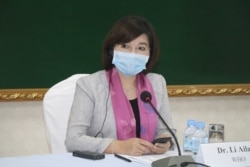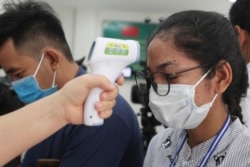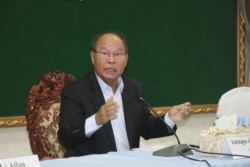The World Health Organization on Monday urged the Cambodian government to prepare for a potential large-scale outbreak of the respiratory disease in the country, and to bolster stocks of personal protective equipment, face masks and ventilators.
The Ministry of Health and relevant stakeholders held a press conference on Monday, where the World Health Organization (WHO) country representative, Dr. Li Ailan, said the situation in Cambodia remains “very, very serious,” despite the low number of reported cases in Cambodia.
As of Tuesday morning, Cambodia had reported 122 cases, with two consecutive days of no new cases. The country has reported 91 recoveries, meaning three-quarters of infected patients had recovered from the respiratory disease. No one in Cambodia has died of the virus, health officials say.
“The top priority is to prepare for the largest-scale outbreak because Cambodia may experience community transmission,” said Dr. Ailan at the press conference. “If not now, we have to prepare for the future.”
If there was a large-scale community transmission, she said, there would be a heavy burden placed on healthcare facilities and medical professionals.
“For example, do we have enough hospital beds where we can check severe patients? I am glad that we’ve also prepared for that,” she said.
“Do we have enough ventilators? Do we have enough personal protective equipment [PPE]? Because many countries have experienced shortages of PPE. And also do we have enough hotels or other facilities we can use for mild cases?” she added.
There has been speculation over Cambodia’s response and preparedness to the novel coronavirus pandemic, with questions raised over its monitoring capabilities, healthcare standards, and if sufficient testing was being carried out to identify new cases.
In early February, researchers at Harvard T.H. Chan School of Public Health, the public health school of Harvard University, modeled the number of potential cases in ASEAN countries based on air travel volume and predicted Cambodia should have had more cases than the one reported case of the virus at the time.
Cambodian Health Minister Mam Bunheng admitted that Cambodia remained at high risk for a viral outbreak, hinting that recent cases in Phnom Penh suggested the possibility of small-scale community transmissions.
“The reported cases in Phnom Penh in recent days were possibly the result of small-scale community transmissions,” he said.
Another concern has been whether Cambodia has conducted a sufficient amount of testing to identify a representative number of positive cases, thereby providing an insight into whether community transmission was prevalent in the country.
Assuming a population of 16 million, Mam Bunheng said Cambodia had conducted 556 tests per one million people, which he said was higher than other ASEAN member states, such as Myanmar, Laos, Indonesia, and the Philippines.
However, excluding passengers aboard on two international cruise ships, Westerdam and Dream World, estimated at around 2,000, the number of tests per million drops close to 431.
It was not immediately clear if the number of tests included the multiple tests conducted on a single person to identify if they had the disease, check if they had recovered and then performed follow-up tests. Last month, the Jack Ma and Alibaba foundations of China donated 20,000 test kits to Cambodia, as well as medical equipment.
Laurence Baril, the director of Institut Pasteur du Cambodge, which is primarily in charge of all testing in Cambodia, said the institute’s laboratories were able to do more tests if needed.
“We can increase [tests] if needed,” she said. “At the moment, you can see we are working under capacity. So, we are on the right track at Pasteur.”
Speaking to VOA News last month, Mark Simmerman, a former epidemiologist for the U.S. Centers for Disease Control and Prevention, said the low number of positive cases in the region were unrealistic.
“It's how hard are you looking, and how aggressively are you testing, and how thoroughly are you following up on every single case, all of their contacts," Simmerman said.
Another concern globally has been the availability of personal protective equipment for healthcare professionals, face masks and medications used to battle the viral disease.
Western nations, like the United States, United Kingdom, Italy, and Spain, among others, have faced severe shortages in these supplies despite having a couple of months head start to prepare for the viral outbreak.
In the region, Malaysia on Monday called on NGOs to help donate PPEs to frontline medical workers, saying stocks would last for no more than two weeks at the current rate of utilization, reported Malaysian publication The Star.
The Jakarta Post earlier this month reported that Indonesia’s efforts to stem the spread of the virus were affected by a shortage in PPEs, which in turn affected testing capacity because medical professionals could not protect themselves safely.
Mam Bunheng said Cambodia had some 200 ventilators and sufficient stock of PPEs in case the situation worsened, though not providing details of the latter.
“We hope that we can respond to the needs of people since [ventilators] are for serious patients,'' the minister said. ''There are only one to two percent of serious patients whose lungs are affected.”
Cambodia has around 670 medical doctors to help tackle the viral pandemic in the country, Mam Bunheng said. Prime Minister Hun Sen has said that Cambodia had prepared some 3,000 makeshift hospital beds across the country by using schools, and had purchased more than 5 million face masks for healthcare workers and people.
During Tuesday's ASEAN virtual summit on COVID-19, Hun Sen urged ASEAN member states to provide support to each other including the sharing of resources, techniques, medical equipment, and supplies. The premier added that Cambodia also supports the establishment of a COVID-19 ASEAN Fund.







